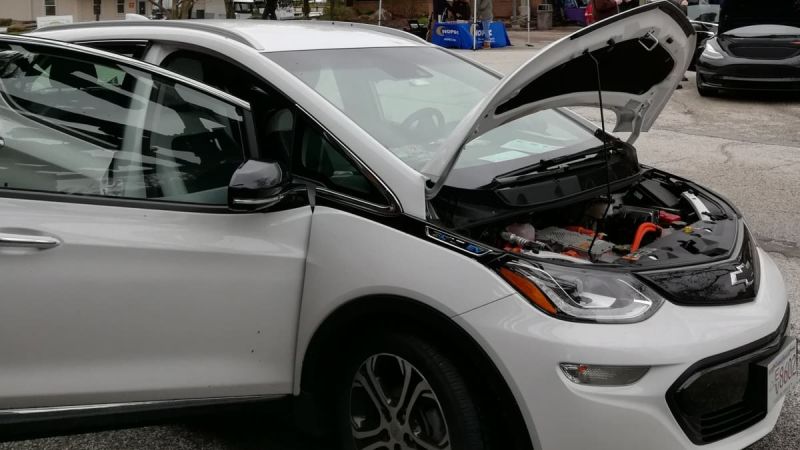General Motors comes in for a lot of flak from many corners, but the reliability of its electric vehicles is not often one of those criticisms leveled at the automaker.
Despite the frequent and unsubstantiated assertion from critics that the battery will be the most troublesome part of any electric vehicle to maintain, long-term owners of the Chevy Volt plug-in hybrid report excellent performance from the electric portion of the much-loved car.
Relieved of the burden of so many combustion engine parts, it follows that the all-electric Chevy Bolt EV reliability is shaping up to deliver an even better record than its now-retired predecessor. Let’s explore several key aspects of the vehicle and see if the Chevy Bolt EV is a reliable car to drive so far.
Early Adopters and the Chevy Bolt EV
It’s fair to say that drivers of the Chevy Bolt EV are early adopters of unproven technology.
Although GM’s Voltec powertrain was established and widely respected by the time the Bolt EV came along in 2016, the automaker had no track record with all-electric cars -- the EV1 fiasco notwithstanding. In fact, the Bolt EV was the first of its kind for any manufacturer at this mid-range price point, with Tesla still a year away from widespread delivery of the Model 3 and the first-generation Nissan Leaf’s range unable to stretch past the 200-mile mark.
At the same time, Nissan experienced some criticism about its battery management system and premature pack degradation, fueling concerns that new electric models like the Bolt EV would see similar problems two or three years down the line.
Well, here we are almost three years later, ready and able to judge just how reliable the Chevy Bolt EV has been to date.
Chevy Bolt EV Recalls
As with most cars, the Chevy Bolt EV has seen a handful of recall notices over its three model years.
One of the most recent, posted in September of 2018, covered an issue with the brake pistons that could reduce braking performance. The recall involved various models across GM’s stable of brands, including the higher end Cadillac and GMC labels, and was easily fixed by a free service at a local dealership.
To find recalls specific to the Chevy Bolt EV, we have to travel further back to the 2017 model year (the car’s first) and an issue unique to electric vehicles. In the spring of 2018, GM issued a voluntary recall for the 2017 Chevy Bolt EV and some early production 2018 models, involving a software issue in the battery management system.
While that issue was also a relatively simple fix with a new software update delivered by dealers, it does highlight an ongoing limitation for General Motors and other legacy manufacturers: the lack of OTA updates. This was one of our three items for GM to fix on the Chevy Bolt EV last month and remains a feature that would quickly raise the company above its immediate rivals, as well as that little bit closer to Tesla.
Going back further still, to the earliest 2017 Chevy Bolt EV model year, we do begin to find more serious teething problems for individual owners, such as replacement battery packs and problematic charge ports.
I recall a handful of tales on various Bolt EV forums about owners noticing diminished range and visiting their dealership expecting a minor fix, only to be told that they would receive a completely new battery pack for the vehicle.
It’s important to note, however, that these were individual issues that never received a wider recall.
GM reportedly went out to around 100 early owners to diagnose and remedy the cell leveling problem, so that those who follow them would never experience the issue. They are isolated cases in the first year of a new vehicle, driven by new technology and a new drivetrain.
All things considered, out of more than 50,000 Bolt EVs sold to date, the relatively small number of battery-specific problems - and the fact that they have largely occurred in early production vehicles - can be taken as a positive sign that General Motors has a firm handle on the monitoring and maintenance of its EV platforms.
(Anecdotally, I drive a 2017 Chevy Bolt EV that falls into the early production category and have only good things to report about battery capacity and performance!)
General Wear and Tear
This is perhaps the most vulnerable category for Bolt EV on reliability, because Chevrolet is positioned as a more affordable vehicle brand. As such, the components used in the Chevy Bolt EV are cheaper and more susceptible to scratches, dings, and other minor malfunctions that are nonetheless annoying for the owner.
Having never been as active in owner forums as I am with those of the Bolt EV, it’s hard to judge just how much of the criticism is commonplace for any vehicle in this class and how much of it is specifically down to the Bolt EV.
It isn’t unusual, for example, to have a couple of posts every week about unidentified noises and minor frustrations with parts of the car. Needing to reboot the Bolt’s infotainment system or having a wiper settle in the wrong position might not seem like reliability issues, but they speak to a broader view of overall quality and upkeep.
In terms of Chevy Bolt EV reliability, though, very few of the reported issues around wear and tear restrict the daily operation of the vehicle.
Perhaps the only true glitch that I’ve personally encountered over 25,000 miles that would fall into this category is phantom signals from the blind spot detection system. These started to appear around 17,000 miles in and are genuinely distracting, as they take the driver’s eyes off the road for something that isn’t there. Again, though, this was quickly fixed at a routine maintenance visit to our dealership. The technician also noted it as an issue that has appeared on other non-electric Chevrolet models, laying this issue more at the door of the brand, rather than one specific to Chevy Bolt EV reliability.
Allowing for a certain degree of cost-cutting and the inevitable fact that this brand doesn’t come with the same robust build and attention to detail that a high-end automaker might bring, general wear and tear on the Chevy Bolt EV is roughly what one would expect to see.
Battery Degradation
Tracking battery degradation is not as simple as it could be on the Chevy Bolt EV. Whereas first-generation electric vehicles like the Nissan Leaf offered a clear battery bar system and the Chevy Volt had a relatively low electric range that made it more noticeable when several miles disappear from a full charge, the Bolt has neither of these.
If I get fewer miles on a full charge than expected, it’s unlikely to show battery degradation. It’s typically because I’m going faster, using the HVAC system more often, or driving in significantly different temperatures than were experienced over the last full charge.
In order to accurately measure the Chevy Bolt EV’s reliability in terms of battery longevity, we would need to accumulate various data points from a broad section of Bolt EV drivers with diverse use cases. We know that General Motors has access to such data through its OnStar diagnostics system, as this is how the company flagged the isolated battery pack issues mentioned earlier.
Whether or not the automaker will share results with owners is another question, but CEO Mary Barra has proudly announced, on the topic of Chevy Volt and Bolt EV reliability, that no battery on these models has ever been replaced due to common degradation through everyday use.
For what it’s worth, the video below documents one high mileage owner’s attempt to calculate degradation and current battery reliability on his 2017 Chevy Bolt EV.
Again, it should be noted that this is just a single data point and other owners have questioned whether it can be applied to newer models. Measuring by range or available battery capacity can vary significantly across different vehicles and possibly even model years, as we can see from the improvement of battery management software in the 2019 Chevy Bolt EV.
Battery degradation is by its very nature a long-term concern and it really is too early to say for certain that the Chevy Bolt EV’s reliability in this area is assured. What we do know is that drivers with almost 100,000 miles under their belts report remarkably little degradation, even after potentially debilitating user habits such as regular DC fast charging and driving in extreme heat.
From what we know so far - and coupled with the proven reliability of the more complex Chevy Volt - the Chevy Bolt EV’s battery is carefully managed and can be relied upon to keep delivering more than 200 miles per charge well into the car’s life.
That being said, we’ll be taking a deeper dive into battery management and Chevy Bolt EV reliability in this area for a future story, so stay tuned if it’s a subject that interests you.
In summary, the Chevy Bolt EV has had its share of early battery teething problems specific to electric vehicles, as well as minor quibbles that would affect any vehicle, whether electric or combustion engine.
On its third model year, however, and backed up by the impressive track record of the Chevy Volt, Chevy Bolt EV reliability appears to be very good. General Motors has the battery pack management in a place that may feel conservative to some drivers, myself included, but which stands to deliver greater longevity to the car’s most critical component. The thermal management system is likely to negate some of the problems that afflicted the first-generation Nissan Leaf models and which continue to dog the brand to this day.
Here's more on why Nissan lost its lead as the premier non-Tesla EV brand.
A visit to any Chevy or GM electric vehicle forum should confirm the reliability of the Chevy Bolt EV, as well as highlighting a few niggling issues that owners still experience. In the grand scheme of things, the car's record is starting off very well given the troubles that more other manufacturers are facing.
If you drive a Chevy Bolt EV or a Chevy Volt, let us know in the comments how it’s holding up. See you in the next story where I am discussing what should be the minimum acceptable range for electric cars based on the case of 2020 Mini Cooper SE.
If you avoided the car on grounds of reliability, share what the problem was with us and if your alternative worked out as expected. See you in my next story where I am discussing 6 tips to prepare your electric car for the winter.
Steve Birkett is an electric vehicle advocate at Plug & Play EV. You can follow him on Twitter at @Plugandplayev, Instagram and Youtube at Plugandplayev Channel to send him EV news tips.
Set Torque News as Preferred Source on Google












Comments
Very interesting. Hopefully
Permalink
In reply to The dealer sees no error by Mary Kennedy (not verified)
Very interesting. Hopefully I understand the correct sequence of events: the sudden loss of range was before the dealer applied the software update. The problem on Mary’s Bolt reads very much like her car is suffering the issue the software update is supposed to help proactively detect, namely sudden loss of propulsion.
From what I have read, the high voltage battery is composed of groups of individual cells and what can happen is that within a group of cells, one cell may develop a voltage drop and cause the whole group to become inoperative and then shut down the entire battery. The software update is supposed to change the monitoring so that the voltage drop is detected before the whole battery shuts down, giving the driver opportunity to safely stop the car. The software update does not prevent the problem, rather it increases the time between detection and the car becoming inoperative.
The second part of this issue is that there were admitted manufacturing defects in supposedly a small number of Bolt batteries used in early 2017 Bolts. GM reportedly monitors the fleet of Bolts via telemetry delivered back to GM over the OnStar link. News reports from 2018 wrote that GM claimed it was able to identify the data signature of defective batteries in the telematics data and individually contact the owners of the affected cars. The claim at the time was that only about 100 or so Bolts suffered from the defective batteries.
They will say it's the cold,
Permalink
In reply to I have leased a 2017 bolt for by Mary Kennedy (not verified)
They will say it's the cold, as my local dealer said to me. But San Diego? Don't think that's applicable.
I own a Bolt that is un
Permalink
In reply to I have leased a 2017 bolt for by Mary Kennedy (not verified)
I own a Bolt that is un drivable and I am wondering if you got resolve with your problems
My 2019 Bolt just had a
Permalink
My 2019 Bolt just had a catastrophic battery failure at 12,300 miles. Didn’t have warning at all but I was fortunate to be at a stoplight. I love my car but this should never happen. It seems that battery failure is rare. I suppose I will go to a casino and play dice betting with the house.
I upgraded from a 2017 Volt
Permalink
I upgraded from a 2017 Volt to a 2019 Bolt. Both very enjoyable to drive. I had one warranty repair to the volt, a wire frayed, leading to it being towed to the dealership. The bolt has been great, tire rotation has been the only maintenance. My next vehicle will probably be a tesla, because the Supercharging network, speed of charging, and enhanced autopilot is a big selling point.
Another 2017 Bolt ev owner
Permalink
Another 2017 Bolt ev owner here and just my 2 cents. With just shy of 36k miles I have nothing to complain about other than the front seats are not as comfortable as they should be due to being rather narrow. I traded in a 2013 Volt which I also had absolutely nothing to complain about other than I wanted to completely do away with gasoline.
I haven’t owned a GM car before the two just mentioned because I constantly heard horror stories about them. Ford, Honda and Toyota is what I am used to and have purchased 15 new cars over the years, so I have enough history to say this: anyone who says Chevrolet Bolts are a POS is actually talking about their own stupid uninformed opinion.
BTW, I tested a model 3 before I got the Bolt. No hatchback = the wrong car for me despite everything else being very impressive. Everything except the price since the $35k base model turned out to be a Elon pipe dream.
I will never go back to ICE again, and I like my Bolt EV just fine. To each his own.
I drive a 2019 bolt with
Permalink
I drive a 2019 bolt with about 8000 miles at this writing, very disappointed with mileage indicated available after a full charge . The available miles indicated are never 230 or anything close , the highest it indicates is 135 —141 complained to the dealer and GM customer service with no resolution, the dealers position is that I am charging with 110 not 220. Now with the recent re-call depleting the maximum charge to 90% it is a whole new ballgame. I think diesel is my next choice
I recently became a new GM
Permalink
I recently became a new GM owner after getting the 2021 Bolt. Love driving this little rocket around town. It's a very capable car with good amenities. The 360 all around view camera is awesome, you don't typically find it on compact cars, not even Tesla has one.
I also have the Tesla model 3 for three years and plan to keep it for at least another five years. The cost of ownership is much lower for the Bolt, and so far I love both cars.
My first EV was the Honda Fit EV (very limited availability),
and I don't see myself going back to pure gasoline engine car ever.
how does cold weather
Permalink
how does cold weather climates affect the Bolt? (or any EV car)?
i am in Maine
thanks folks
L
Lance, Mass.-based Bolt owner
Permalink
In reply to how does cold weather by Lance (not verified)
Lance, Mass.-based Bolt owner here. When temperatures dip below 40F for extended periods, we start to see diminished range as a result of increased resistance/less efficient chemical processes in the battery pack. The heater is also quite energy-hungry, which can result in ~30% losses on very cold days. Charging at home, pre-heating the car while plugged-in, and using heated seats/steering wheel can mitigate these losses in the Bolt EV specifically, while a heat pump can be used in other models to heat the car more efficiently.
so,.say i wanna go skiing 70
Permalink
In reply to Lance, Mass.-based Bolt owner by Ste (not verified)
so,.say i wanna go skiing 70 miles away, Temp at 6am is around 20 degrees. I have a nearly full charge. (pronounced "chaahg" lol). wdda you think? tell me more. (pronounced "mowuh" lol) What kind of loss of charge etc?
thanks a bunch.
L
You should be in good shape
Permalink
You should be in good shape on a single "chaahg", providing you preheat the cabin from the wall as described, run a low heat (fan setting 2 and heat around 70F), and stick around the speed limit.I'd expect to arrive home pretty low though, perhaps around 10% or lower, which would put your overall mileage around 150-160 miles and arriving back with 15-20 remaining. Arranging charging at the ski resort (or while you eat... or "pahhk" =) or a quick stop to fast charge (if available) for 10-15 minutes would make it more comfortable if a low state of charge makes you uneasy.
Great info, thanks!
Permalink
Great info, thanks!
much appreciated!
L
I have owned a 2013 Chevy…
Permalink
I have owned a 2013 Chevy Volt purchased in 12/31/2013. I have had no difficulties until i started having strut problems. I replaced left front strut several years ago. in 9/2013 I needed the entire front strut replaced. It ran rough and with increasing noise, it was replaced for free under warranty. Has anyone else had difficulty with the front strut? This last inspection reviewed need for the transmission mount repair and left brake caliper repair. I am now selling the car for a used 2021 Bolt with very low mileage. Will be likely selling privately.
Pagination